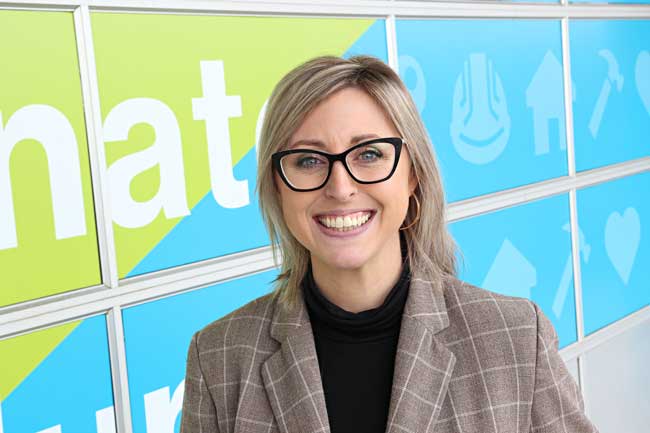article by Jessica Simpkins, MD, photo by Val Mohney
Many people in the United States (and around the world) have struggled with housing instability and securing access to affordable housing. With the COVID-19 pandemic, access to affordable housing has become an even bigger challenge. Habitat for Humanity-Spokane has been helping alleviate this problem since it was founded in 1987, and continues to tackle this obstacle from a variety of angles.
Chief Executive Officer Michelle Girardot of Habitat for Humanity-Spokane shares with us some important information about their mission and operations. “Habitat for Humanity is the umbrella organization which serves communities around the world. Under this umbrella is somewhere between 1,500 and 2,000 affiliates throughout the United States. In the state of Washington, we have 30-some affiliates who each serve one or a few counties. Our overarching goal is to help individuals have access to affordable housing, and we meet this goal through a variety of ways.”
Michelle highlights the high cost of housing in Spokane: “If in Spokane County the average cost of a three bedroom, two bathroom home is more than $400,000 but you’re a family who is only earning 40% of the area median income, you can only realistically pay maybe $120,000 on that home. So what do we do with that gap? This is where we deploy public funding, we advocate for changes to policies, and make sure people have access to credit, such as down payment assistance programs or construction subsidies.”
Michelle continues: “Since our Spokane affiliate group was founded in 1987 by a small group of volunteers in the basement of St. Mark’s church on South Hill, we have built over 380 homes. We have a home ownership program that is unique. We work with families whose income is less than 60% of the area median income. To qualify for our program, they must have a need for affordable housing and are currently paying more than 30% of their income for their housing needs, are willing to pay up to 30% of their income toward a mortgage (which includes low interest rate, utilities, taxes), and a willingness to earn between 200-250 hours of sweat equity, which includes being a part of the building process of their or another’s home, and actively learning how to be a successful home buyer.”
“What we saw during the pandemic in Spokane, was a number of people who paid cash to purchase homes here because of the natural beauty of Eastern Washington and their newfound ability to work remotely. West Central Spokane is an area that has had an influx of investors that moved in, and ultimately the people that had been living there, some for generations, were pushed out because they were no longer able to afford living there. Helping to establish permanently affordable home ownership in these neighborhoods will ensure families won’t be priced out and forced to move. We know that children who have to move multiple times lose out on important education and the benefits of stability that come with staying in the same area,” Michelle explains.
For Michelle, the emphasis on housing Spokane’s families and children is of special interest. Before coming to Habitat for Humanity-Spokane as a member of Americorps in 2010, she had been working as a Kindergarten teacher. “I had a lot of Habitat kids in my class, and I saw how much housing instability hinders a child’s ability to learn, starting at an early age. Not just learning letters and numbers, but also social skills. I knew I wanted to help in a bigger way.”
She began as a volunteer coordinator and over the years has served in almost every position within the organization. “The only thing I haven’t participated in is construction. I want to make sure our homeowners have high-quality homes, and they are better without me in that role,” Michelle laughs.
In addition to serving as chief executive director of Habitat for Humanity-Spokane, Michelle is also the chair of Habitat of Washington State, an organization which supports all of the Washington Habitat for Humanity affiliates. “Our affiliates serve the needs of their local communities, and we serve those affiliates. We lobby in Olympia and at the federal level to advocate for funding and changes in regulations and laws. We are also a really good bulldog at identifying other funding sources or support avenues for individual affiliates. And we make sure our affiliates are prepared for any changes that we see coming down the line.”
Michelle has a request she wishes to share: “As a volunteer-driven organization, we need volunteers to help us fulfill our mission of providing greater access to affordable housing. One of our current projects is a development in Deer Park, WA and we sorely need more hands to help us build these homes. This development began in 2012 and is called Hope Meadows. We plan to have 114 twin homes completed by the end of 2024, but we need all the help we can get!”
Anyone interested in helping to support Habitat for Humanity-Spokane can fill out the volunteer form online at www.habitat-spokane.org. “All of our build sites are ADA accessible. Our construction team will work with you where you’re at, whether you have zero experience with construction or you’re an expert. While we are focused on fun and giving back to the community, safety is always our top priority,” Michelle explains. For businesses or other groups of 20 or fewer interested in combining forces for a team-building day, please call their volunteer coordinator at (509)534-2552 to set up the ideal day and time just for your group!

